英语副词用法总结(完整)
英语副词用法总结

英语副词用法总结副词是一种用来修饰动词、形容词、其他副词、短语或者整个句子的词类。
副词为我们提供了更多的信息来描述或修改其他词或短语的含义。
副词的用法总结如下:1.副词修饰动词:-副词可以用来修饰动词的方式、程度、频率等。
例句:- He ran quickly to catch the bus.- She speaks fluently in English.- They often go hiking on weekends.2.副词修饰形容词或其他副词:-副词可以用来修饰形容词或其他副词,表示程度或方式。
例句:- The weather is extremely hot today.- She sings beautifully.- He drives quite fast.3.副词修饰短语或介词短语:-副词可以用来修饰短语或介词短语,表示方式、程度或时间。
例句:- She walked into the room quietly.- They arrived late for the meeting.- He looked at her lovingly.4.副词修饰整个句子:-副词可以用来修饰整个句子,表示说话者的观点、态度或推测等。
例句:- Frankly, I don't agree with you.- Hopefully, everything will be fine.- Apparently, she didn't receive my message.需要注意的是,副词可以通过在词根后面加上-ly来构成,但并非所有以-ly结尾的词都是副词。
有些以-ly结尾的词是形容词,如friendly、silly等。
当副词修饰动词时,它们通常放在动词之后,但有些情况下它们也可以放在句尾。
副词的位置比较灵活,但需要确保它们与所修饰的词或短语之间的关系明确。
英语副词的用法总结
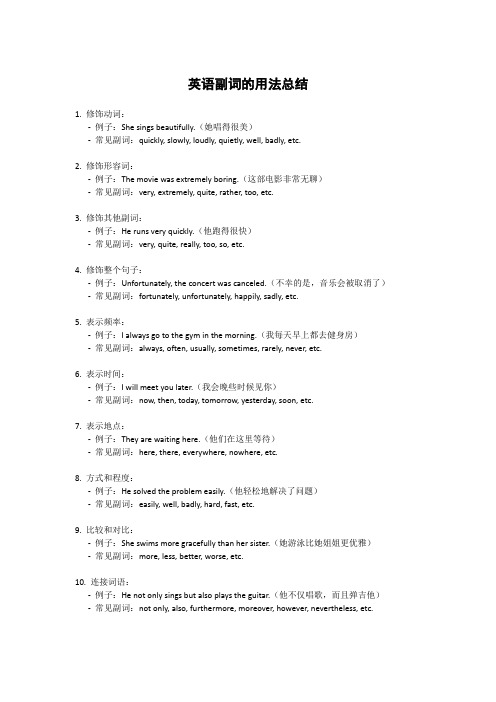
英语副词的用法总结1. 修饰动词:-例子:She sings beautifully.(她唱得很美)-常见副词:quickly, slowly, loudly, quietly, well, badly, etc.2. 修饰形容词:-例子:The movie was extremely boring.(这部电影非常无聊)-常见副词:very, extremely, quite, rather, too, etc.3. 修饰其他副词:-例子:He runs very quickly.(他跑得很快)-常见副词:very, quite, really, too, so, etc.4. 修饰整个句子:-例子:Unfortunately, the concert was canceled.(不幸的是,音乐会被取消了)-常见副词:fortunately, unfortunately, happily, sadly, etc.5. 表示频率:-例子:I always go to the gym in the morning.(我每天早上都去健身房)-常见副词:always, often, usually, sometimes, rarely, never, etc.6. 表示时间:-例子:I will meet you later.(我会晚些时候见你)-常见副词:now, then, today, tomorrow, yesterday, soon, etc.7. 表示地点:-例子:They are waiting here.(他们在这里等待)-常见副词:here, there, everywhere, nowhere, etc.8. 方式和程度:-例子:He solved the problem easily.(他轻松地解决了问题)-常见副词:easily, well, badly, hard, fast, etc.9. 比较和对比:-例子:She swims more gracefully than her sister.(她游泳比她姐姐更优雅)-常见副词:more, less, better, worse, etc.10. 连接词语:-例子:He not only sings but also plays the guitar.(他不仅唱歌,而且弹吉他)-常见副词:not only, also, furthermore, moreover, however, nevertheless, etc.。
(完整word版)英语中副词及用法
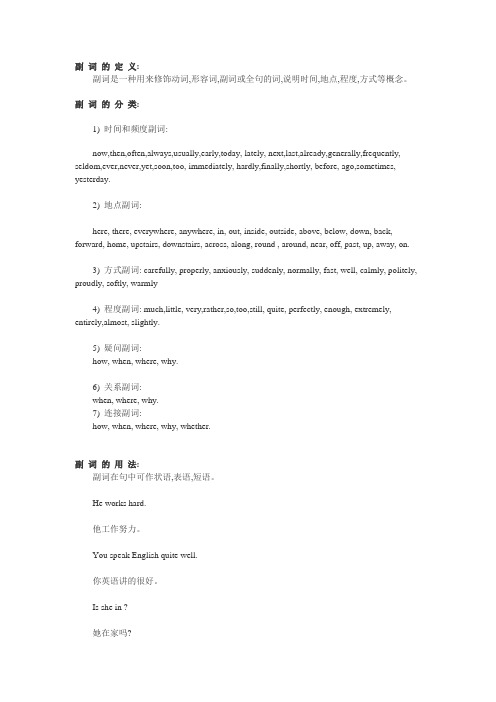
副词的定义:副词是一种用来修饰动词,形容词,副词或全句的词,说明时间,地点,程度,方式等概念。
副词的分类:1) 时间和频度副词:now,then,often,always,usually,early,today, lately, next,last,already,generally,frequently, seldom,ever,never,yet,soon,too, immediately, hardly,finally,shortly, before, ago,sometimes, yesterday.2) 地点副词:here, there, everywhere, anywhere, in, out, inside, outside, above, below, down, back, forward, home, upstairs, downstairs, across, along, round , around, near, off, past, up, away, on.3) 方式副词: carefully, properly, anxiously, suddenly, normally, fast, well, calmly, politely, proudly, softly, warmly4) 程度副词: much,little, very,rather,so,too,still, quite, perfectly, enough, extremely, entirely,almost, slightly.5) 疑问副词:how, when, where, why.6) 关系副词:when, where, why.7) 连接副词:how, when, where, why, whether.副词的用法:副词在句中可作状语,表语,短语。
He works hard.他工作努力。
副词的用法总结
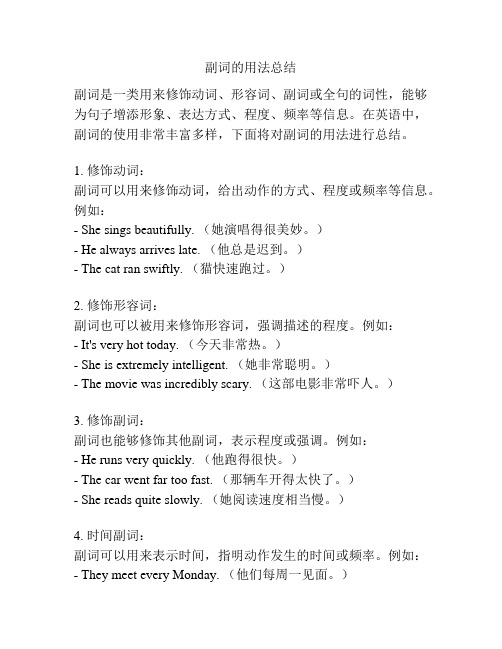
副词的用法总结副词是一类用来修饰动词、形容词、副词或全句的词性,能够为句子增添形象、表达方式、程度、频率等信息。
在英语中,副词的使用非常丰富多样,下面将对副词的用法进行总结。
1. 修饰动词:副词可以用来修饰动词,给出动作的方式、程度或频率等信息。
例如:- She sings beautifully. (她演唱得很美妙。
)- He always arrives late. (他总是迟到。
)- The cat ran swiftly. (猫快速跑过。
)2. 修饰形容词:副词也可以被用来修饰形容词,强调描述的程度。
例如:- It's very hot today. (今天非常热。
)- She is extremely intelligent. (她非常聪明。
)- The movie was incredibly scary. (这部电影非常吓人。
)3. 修饰副词:副词也能够修饰其他副词,表示程度或强调。
例如:- He runs very quickly. (他跑得很快。
)- The car went far too fast. (那辆车开得太快了。
)- She reads quite slowly. (她阅读速度相当慢。
)4. 时间副词:副词可以用来表示时间,指明动作发生的时间或频率。
例如:- They meet every Monday. (他们每周一见面。
)- I will do it later. (我会晚些时候去做。
)- She woke up early this morning. (她今早早醒来。
)5. 地点副词:副词可以用来表示地点或方向。
例如:- He lives nearby. (他住在附近。
)- The bird flew upwards. (鸟向上飞。
)- Please put it here. (请把它放在这里。
)6. 方式副词:副词还可以表示行为或动作的方式。
例如:- They walked quietly. (他们悄悄地走着。
英语中副词的用法
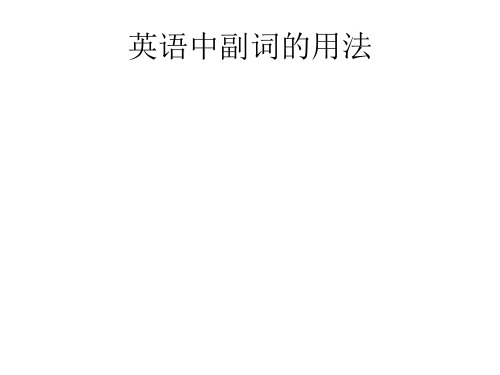
• 、“the same +名词+as”表示同等比较、 • His room is the sam big as mine
兼有两种形式的副词
• •
• • • • • •
1) close与closely close意思是"近"; closely 意思是"仔细 地" He is sitting close to me. Watch him closely. 2) late 与lately late意思是"晚"; lately 意思是"最近" You have come too late. What have you been doing lately?
• 3) 方式副词: • carefully, properly(适当地), anxiously(焦虑地), suddenly, normally(正常地), fast, well, calmly(冷 静地), politely(有礼貌地), proudly(自豪地), softly, warmly ,slowly • 4) 程度副词: • much,little, very,rather(相当),so,too,still, quite, perfectly(完美地), enough, extremely(非常), entirely(整个),almost, slightly(细小地), hardly. • 5) 疑问副词: • how, when, where, why.
• 5) 时间副词和地点副词在一个句中, 地点副词 在前面,时间副词在后面。 • We went shopping in the supermarket at 9 o'clock yesterday. • 昨天九点钟我们到超市买东西了. • What were you doing in the classroom yesterday afternoon? • 昨天下午你在教室里干什么? • The accident took place in the Eleven Avenue one hour ago. • 这场事故在一小时前发生在十一号大街。 •
高中英语知识点归纳副词短语的用法
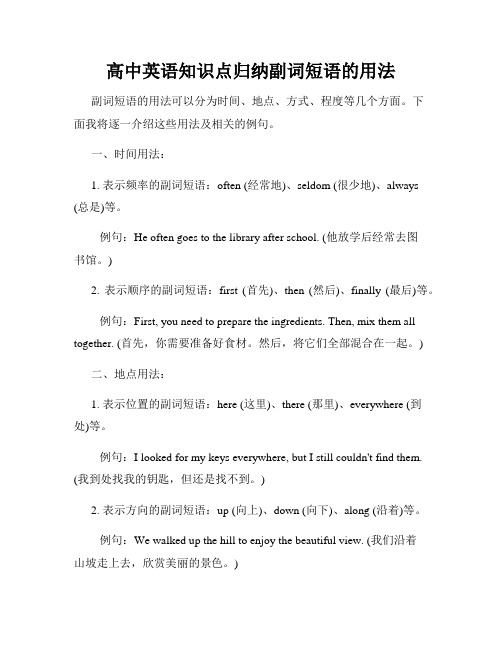
高中英语知识点归纳副词短语的用法副词短语的用法可以分为时间、地点、方式、程度等几个方面。
下面我将逐一介绍这些用法及相关的例句。
一、时间用法:1. 表示频率的副词短语:often (经常地)、seldom (很少地)、always (总是)等。
例句:He often goes to the library after school. (他放学后经常去图书馆。
)2. 表示顺序的副词短语:first (首先)、then (然后)、finally (最后)等。
例句:First, you need to prepare the ingredients. Then, mix them all together. (首先,你需要准备好食材。
然后,将它们全部混合在一起。
)二、地点用法:1. 表示位置的副词短语:here (这里)、there (那里)、everywhere (到处)等。
例句:I looked for my keys everywhere, but I still couldn't find them. (我到处找我的钥匙,但还是找不到。
)2. 表示方向的副词短语:up (向上)、down (向下)、along (沿着)等。
例句:We walked up the hill to enjoy the beautiful view. (我们沿着山坡走上去,欣赏美丽的景色。
)三、方式用法:1. 表示方式的副词短语:carefully (小心地)、quickly (快速地)、quietly (安静地)等。
例句:She spoke quietly so as not to wake the baby. (她小声说话,以免把孩子吵醒。
)2. 表示状态的副词短语:happily (快乐地)、sadly (悲伤地)、nervously (紧张地)等。
例句:The children jumped happily when they heard the good news. (孩子们在听到好消息时高兴地跳了起来。
英语中副词及用法规律总结
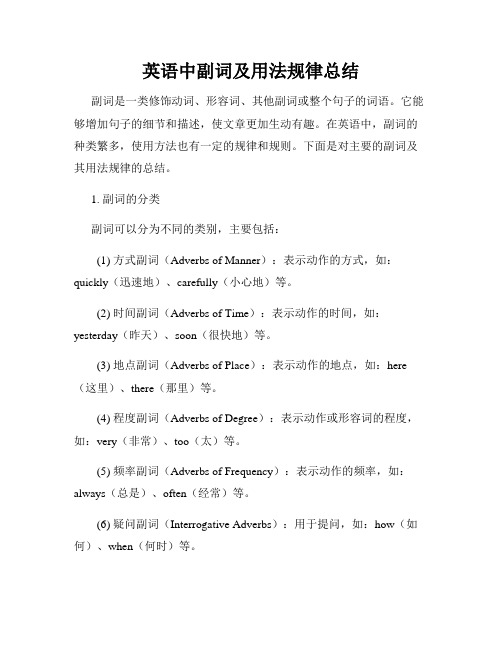
英语中副词及用法规律总结副词是一类修饰动词、形容词、其他副词或整个句子的词语。
它能够增加句子的细节和描述,使文章更加生动有趣。
在英语中,副词的种类繁多,使用方法也有一定的规律和规则。
下面是对主要的副词及其用法规律的总结。
1. 副词的分类副词可以分为不同的类别,主要包括:(1) 方式副词(Adverbs of Manner):表示动作的方式,如:quickly(迅速地)、carefully(小心地)等。
(2) 时间副词(Adverbs of Time):表示动作的时间,如:yesterday(昨天)、soon(很快地)等。
(3) 地点副词(Adverbs of Place):表示动作的地点,如:here (这里)、there(那里)等。
(4) 程度副词(Adverbs of Degree):表示动作或形容词的程度,如:very(非常)、too(太)等。
(5) 频率副词(Adverbs of Frequency):表示动作的频率,如:always(总是)、often(经常)等。
(6) 疑问副词(Interrogative Adverbs):用于提问,如:how(如何)、when(何时)等。
(7) 连接副词(Conjunctive Adverbs):用于连接句子,如:however(然而)、therefore(因此)等。
2. 副词的用法规律(1) 修饰动词:副词可以用来修饰动词,描述动作的方式、时间、地点等,如:He runs quickly(他跑得快)。
(2) 修饰形容词:副词可以用来修饰形容词,表示形容词的程度,如:It's very hot(非常热)。
(3) 修饰其他副词:副词可以用来修饰其他副词,表示程度、方式等,如:He speaks very fluently(他说得非常流利)。
(4) 修饰整个句子:副词可以用来修饰整个句子,表示说话者的观点、态度等,如:Certainly, I will help you(当然,我会帮助你)。
英语副词的用法总结
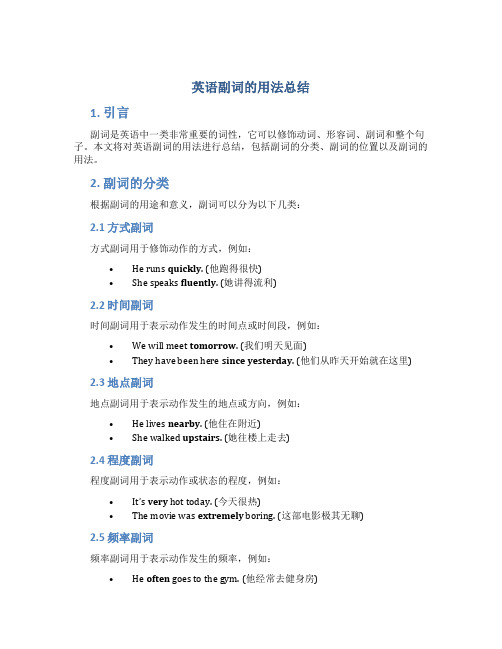
英语副词的用法总结1. 引言副词是英语中一类非常重要的词性,它可以修饰动词、形容词、副词和整个句子。
本文将对英语副词的用法进行总结,包括副词的分类、副词的位置以及副词的用法。
2. 副词的分类根据副词的用途和意义,副词可以分为以下几类:2.1 方式副词方式副词用于修饰动作的方式,例如:•He runs quickly. (他跑得很快)•She speaks fluently. (她讲得流利)2.2 时间副词时间副词用于表示动作发生的时间点或时间段,例如:•We will meet tomorrow. (我们明天见面)•They have been here since yesterday. (他们从昨天开始就在这里)2.3 地点副词地点副词用于表示动作发生的地点或方向,例如:•He lives nearby. (他住在附近)•She walked upstairs. (她往楼上走去)2.4 程度副词程度副词用于表示动作或状态的程度,例如:•It’s very hot today. (今天很热)•The movie was extremely boring. (这部电影极其无聊)2.5 频率副词频率副词用于表示动作发生的频率,例如:•He often goes to the gym. (他经常去健身房)•I rarely eat fast food. (我很少吃快餐)3. 副词的位置副词通常位于动词、形容词或其他副词之前,例如:•She quickly ate her breakfast. (她迅速地吃完早餐)•He is really tall. (他真的很高)但是有一些副词可以放在句首或句尾,例如:•Fortunately, he passed the exam. (幸运的是,他通过了考试)•I will go there tomorrow anyway. (无论如何,我明天会去那里)4. 副词的用法除了修饰动词、形容词和其他副词外,副词还有一些其他的用法:4.1 强调副词强调副词用于强调某个词或句子的重要性,例如:•He actually came to the party. (他居然来参加了派对)•She indeed knows a lot about art. (她确实懂很多艺术)4.2 连接副词连接副词用于连接两个句子或句子成分,例如:•I like coffee; however, I prefer tea. (我喜欢咖啡,然而,我更喜欢茶)•They didn’t win the game; instead, they lost. (他们没有赢得比赛,相反,他们输了)4.3 疑问副词疑问副词用于引导疑问句,例如:•Why is he late? (他为什么迟到了?)•Where did they go? (他们去了哪里?)5. 结论副词在英语中起着非常重要的作用,它可以丰富句子的意义,表达动作的方式、时间、地点、程度和频率等信息。
副词用法总结
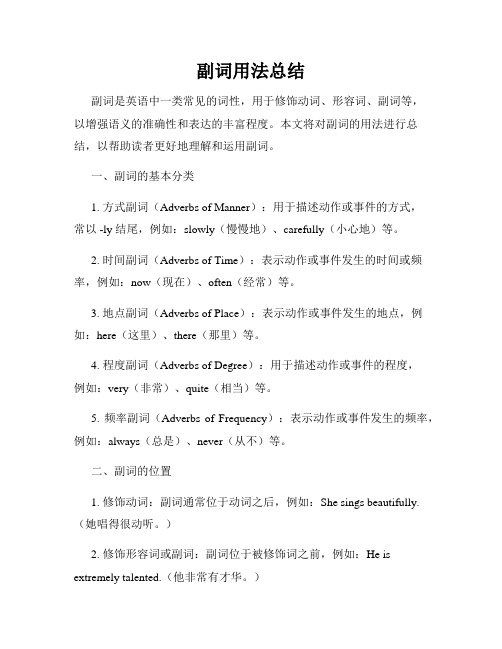
副词用法总结副词是英语中一类常见的词性,用于修饰动词、形容词、副词等,以增强语义的准确性和表达的丰富程度。
本文将对副词的用法进行总结,以帮助读者更好地理解和运用副词。
一、副词的基本分类1. 方式副词(Adverbs of Manner):用于描述动作或事件的方式,常以 -ly 结尾,例如:slowly(慢慢地)、carefully(小心地)等。
2. 时间副词(Adverbs of Time):表示动作或事件发生的时间或频率,例如:now(现在)、often(经常)等。
3. 地点副词(Adverbs of Place):表示动作或事件发生的地点,例如:here(这里)、there(那里)等。
4. 程度副词(Adverbs of Degree):用于描述动作或事件的程度,例如:very(非常)、quite(相当)等。
5. 频率副词(Adverbs of Frequency):表示动作或事件发生的频率,例如:always(总是)、never(从不)等。
二、副词的位置1. 修饰动词:副词通常位于动词之后,例如:She sings beautifully.(她唱得很动听。
)2. 修饰形容词或副词:副词位于被修饰词之前,例如:He is extremely talented.(他非常有才华。
)3. 修饰句子:副词位于句子开头或结尾,例如:Certainly, I will help you.(当然,我会帮助你。
)三、副词的比较级和最高级1. 比较级:用于表示两个事物之间的比较,通常在副词前加更(more)或-er,并在副词后加than,例如:She runs more quickly than him.(她跑得比他快。
)2. 最高级:用于表示三个或三个以上事物之间的比较,通常在副词前加most(形容词前为the most)或-est,并在副词后加of,例如:He speaks the most fluently of all.(他说话是所有人中说得最流利的。
英语副词的用法归纳总结

英语副词的用法归纳总结英语副词( Adverbs)是一类词汇,用来修饰动词、形容词、其他副词或整个句子,以表达时间、地点、程度、方式或频率等概念。
以下是英语副词的用法归纳总结:1.(修饰动词•程度副词( Adverbs(of(Degree):(表示程度或强度,如("very" 非常)、"extremely"( 极其)、"quite"( 相当)、"rather"( 有点)、"too" 太)、"enough" 足够)等。
•例句:She(speaks(very(softly.•方式副词 Adverbs(of(Manner):(描述动作或事件的方式,如("slowly" 慢慢地)、"carefully" 小心地)、"quickly" 快速地)、"happily" 快乐地)等。
•例句:He(ran(quickly(to(catch(the(bus.•频率副词 Adverbs(of(Frequency):(表示动作发生的频率,如("always"( 总是)、"often"( 经常)、"sometimes"( 有时候)、"never" 从不)、"rarely" 很少)等。
•例句:She(always(arrives(early(for(work.2.(修饰形容词或其他副词•程度副词 Adverbs(of(Degree):(可以用来修饰形容词或其他副词,以增强或减弱它们的含义。
•例句:The(weather(is(very(hot(today.(She(sings(extremely(well.3.(修饰句子•状语 Adverbial(Phrase):(由一个或多个副词构成的短语,用来修饰整个句子,表达时间、地点、条件、原因等。
[英语语法手册]副词概说及其用法
![[英语语法手册]副词概说及其用法](https://img.taocdn.com/s3/m/70596784b9d528ea81c77916.png)
I think he is the best possible man for the job.我认为他做这工作最合适。(也可以说the best man possible)
Swimming in winter is the best form of exercise imaginable.冬泳是最好的运动方式。(也可以说the best imaginable form)
Our county's agricultural output this year is 5 per cent higher than that of last year.我们县今年农业产量比去年增长百分之五。
表示程度
可用much,far,still,even,a 1itt1e,no,any,a great deal等状语来修饰形容词和副词的比较级。如:
He is twice my age.他的年龄比我大一倍。
This lake is four times the size of that one.这个湖有那个湖四个大。
The irrigated area in this province is four times bigger than in l978.这个省的灌溉面积比1978年增加三倍。(four times bigger than = four times as big as)
Her eldest daughter is a school teacher.她大女儿是个教员。
My elder brother is in college. He is two years older than I. 我哥哥在上大学,他比我大两岁。
(完整版)初中英语副词总结归纳大全
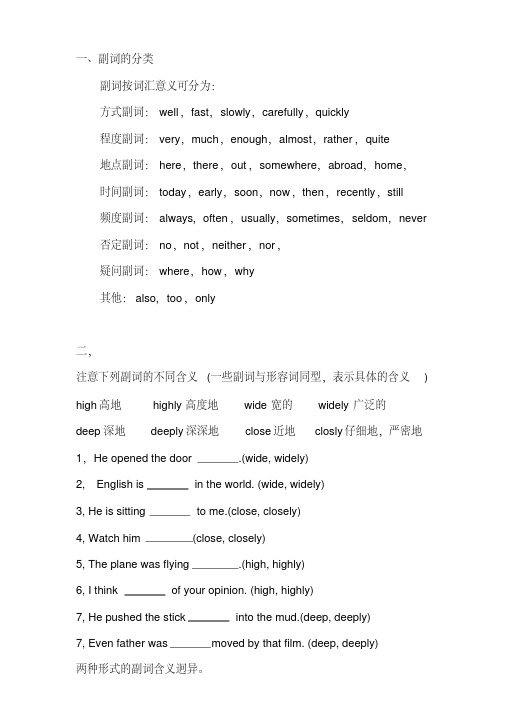
一、副词的分类副词按词汇意义可分为:方式副词:well,fast,slowly,carefully,quickly程度副词:very,much,enough,almost,rather,quite地点副词:here,there,out,somewhere,abroad,home,时间副词:today,early,soon,now,then,recently,still频度副词:always,often,usually,sometimes,seldom,never 否定副词:no,not,neither,nor,疑问副词:where,how,why其他:also,too,only二,注意下列副词的不同含义(一些副词与形容词同型,表示具体的含义) high高地highly高度地wide宽的widely广泛的deep深地deeply深深地close近地closly仔细地,严密地1,He opened the door .(wide, widely)2, English is in the world. (wide, widely)3, He is sitting to me.(close, closely)4, Watch him (close, closely)5, The plane was flying .(high, highly)6, I think of your opinion. (high, highly)7, He pushed the stick into the mud.(deep, deeply)7, Even father was moved by that film. (deep, deeply)两种形式的副词含义迥异。
late迟,晚lately最近hard努力的,艰苦地hardly几乎不just刚刚,仅仅,恰好justly公正地,正当地most很,最mostly主要地almost几乎,差不多三,其它副词比较:1, already与yet的区别already用于肯定句句中,表示“已经”;yet用于否定句句末,表示“还”,用于疑问句句末,表示“已经”例如,He had already left when I called.当我给他打电话时,他已经离开了。
副词总结归纳

副词总结归纳副词是一类在句子中修饰动词、形容词、副词以及整个句子的词语。
它能够增添句子的信息,使句子更加丰富和准确。
在英语写作中,正确地使用副词对于表达准确的意思至关重要。
下面将对常见副词进行总结归纳,帮助读者更好地理解和应用这些副词。
一、时间副词1.1 表示时间点的副词:- Now(现在)- Then(那时)- Today(今天)- Tomorrow(明天)- Yesterday(昨天)- Early(早)- Late(晚)1.2 表示时间段的副词:- Always(始终)- Never(从不)- Often(经常)- Sometimes(有时)- Rarely(很少)- Usually(通常)- Frequently(频繁地)二、地点副词2.1 地点副词:- Here(这里)- There(那里)- Everywhere(到处)- Nowhere(无处)- Somewhere(某处)- Anywhere(任何地方)2.2 方向副词:- Up(向上)- Down(向下)- Inside(里面)- Outside(外面)- Backward(向后)- Forward(向前)- Sideways(侧身地)三、方式副词3.1 表示方式的副词:- Quickly(快速地)- Slowly(慢慢地)- Carefully(仔细地)- Loudly(大声地)- Quietly(安静地)- Well(好地)- Badly(糟糕地)3.2 延续程度的副词:- Completely(完全地)- Partly(部分地)- Almost(几乎)- Nearly(近乎)- Entirely(完全地)- Barely(勉强)四、程度副词4.1 表示程度的副词:- Very(非常)- Extremely(极其)- Quite(相当)- Really(真正地)- Rather(相当)- Too(太)- Fairly(相当)4.2 表示否定程度的副词:- Not(不)- Never(从不)- Hardly(几乎不)- Rarely(很少)- Scarcely(几乎不)- Seldom(很少)五、频率副词5.1 表示频率的副词:- Always(总是)- Usually(通常)- Often(经常)- Sometimes(有时)- Occasionally(偶尔)- Rarely(很少)- Never(从不)六、方式副词6.1 表示评价的副词:- Well(好)- Badly(糟糕)- Excellently(优秀地)- Perfectly(完美地)- Awfully(糟糕地)- Wonderfully(美妙地)6.2 表示固定搭配的副词:- By accident(偶然地)- On purpose(故意地)- In vain(徒劳地)- In general(一般来说)- For example(例如)- In particular(特别地)总结归纳了一些常见的副词及其分类。
小学英语单词:副词的用法

小学英语单词:副词的用法小学英语单词:副词的用法副词(Adverb)是指在句子中表示行为或状态特征的词,用以修饰动词、形容词、其他副词或全句,表示时间、地点、程度、方式等概念。
副词可分为:时间副词、频率副词、地点副词、方式副词、程度副词、疑问副词、连接副词、关系副词、表顺序的副词。
下面是店铺收集的关于副词的知识点,有兴趣的朋友们可以看看。
1. 副词的用法:(1)修饰动词: He works hard. He speaks slowly.(2)修饰形容词: The flower is very beautiful.(3)修饰其他副词: He works very hard.(4)修饰名词: Even a child (or Even he)can do it.(5)修饰全句: Probably he will come back.(6)修饰副词片语:He came exactly at two o‘clock.(7)修饰副词子句: He started soon after we came.2. 副词的位置(1)副词修饰形容词、副词(片语或子句)时,通常放在前面。
The mountain is very beautiful.He came long before the appointed time.(2)修饰动词的副词不及物动词 + 副词 She speaks well.及物动词 + 受词 + 副词 She speaks English well.(3)表确定时间或场所的副词,通常放在句首或句末,放在句首时语气较强。
She was born in Taipei in 1948.(4)always, never, often, sometimes, usually等频率副词的位置。
(A)在一般动词前: They always say so.(B)有动词be时,在be动词后: I am always busy.(C)有助动词时,在助动词和本动词间: This job will never be finished.(5)置于句首修饰全句:Fortunately he succeeded in the examination.(6)同类两个以上的`副词须依 (单位较小者 + 单位较大者)的顺序排列。
英语中副词及用法规律总结
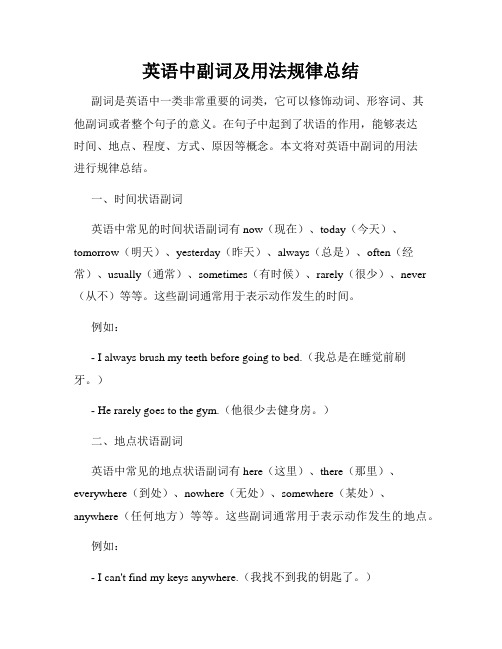
英语中副词及用法规律总结副词是英语中一类非常重要的词类,它可以修饰动词、形容词、其他副词或者整个句子的意义。
在句子中起到了状语的作用,能够表达时间、地点、程度、方式、原因等概念。
本文将对英语中副词的用法进行规律总结。
一、时间状语副词英语中常见的时间状语副词有now(现在)、today(今天)、tomorrow(明天)、yesterday(昨天)、always(总是)、often(经常)、usually(通常)、sometimes(有时候)、rarely(很少)、never (从不)等等。
这些副词通常用于表示动作发生的时间。
例如:- I always brush my teeth before going to bed.(我总是在睡觉前刷牙。
)- He rarely goes to the gym.(他很少去健身房。
)二、地点状语副词英语中常见的地点状语副词有here(这里)、there(那里)、everywhere(到处)、nowhere(无处)、somewhere(某处)、anywhere(任何地方)等等。
这些副词通常用于表示动作发生的地点。
例如:- I can't find my keys anywhere.(我找不到我的钥匙了。
)- There are beautiful flowers everywhere in the garden.(花园里到处都是美丽的花。
)三、方式状语副词英语中常见的方式状语副词有slowly(慢慢地)、quickly(快速地)、carefully(仔细地)、easily(容易地)、quietly(安静地)等等。
这些副词通常用于表示动作进行的方式。
例如:- She speaks English fluently.(她英语说得很流利。
)- The children played happily in the park.(孩子们在公园里开心地玩耍。
)四、程度状语副词英语中常见的程度状语副词有very(非常)、quite(相当)、too (太)、so(如此)、almost(几乎)、only(仅仅)、rather(相当)等等。
【精品】英语副词用法总结(完整)
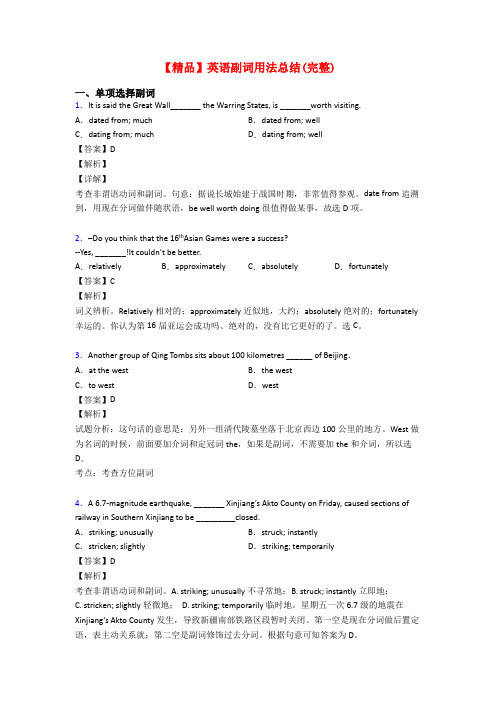
【解析】
【详解】
考查非谓语动词和副词。句意:据说长城始建于战国时期,非常值得参观。date from追溯到,用现在分词做伴随状语,be well worth doing很值得做某事,故选D项。
2.–Do you think that the 16thAsian Games were a success?
考点:考查方位副词
4.A 6.7-magnitude earthquake, _______ Xinjiang’s Akto County on Friday, caused sections of railway in Southern Xinjiang to be _________closed.
--Yes, _______!It couldn’t be better.
A.relativelyB.approximatelyC.absolutelyD.fortunately
【答案】C
【解析】
词义辨析。Relatively相对的;approximately近似地,大约;absolutely绝对的;fortunately幸运的。你认为第16届亚运会成功吗、绝对的,没有比它更好的了。选C。
【答案】A
【解析】
本题考查副词。四个副词的意思分别是skillfully巧妙地,技术好地;commonly一般,普通,通常;willingly自动地,欣然地;nervously焦急地。上文问音乐晚会怎么样?回答是非常好,自然Ales和Andy是娴熟地(skillfully)表演并获得第一名。
C. stricken; slightly轻微地;D. striking; temporarily临时地。星期五一次6.7级的地震在Xinjiang’s Akto County发生,导致新疆南部铁路区段暂时关闭。第一空是现在分词做后置定语,表主动关系就;第二空是副词修饰过去分词。根据句意可知答案为D。
初中英语知识点归纳常见的副词短语用法总结
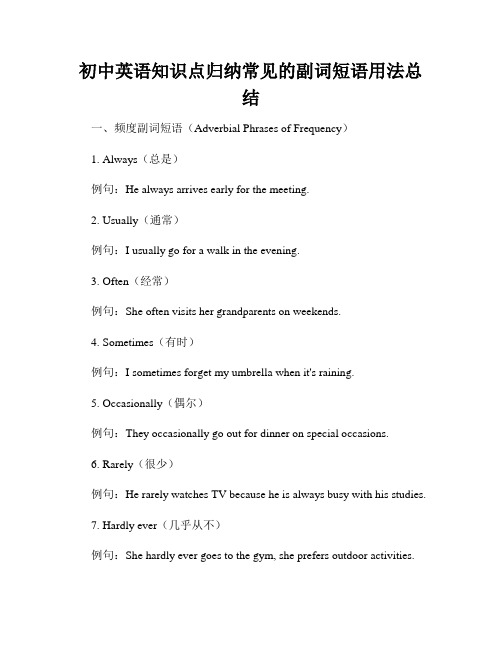
初中英语知识点归纳常见的副词短语用法总结一、频度副词短语(Adverbial Phrases of Frequency)1. Always(总是)例句:He always arrives early for the meeting.2. Usually(通常)例句:I usually go for a walk in the evening.3. Often(经常)例句:She often visits her grandparents on weekends.4. Sometimes(有时)例句:I sometimes forget my umbrella when it's raining.5. Occasionally(偶尔)例句:They occasionally go out for dinner on special occasions.6. Rarely(很少)例句:He rarely watches TV because he is always busy with his studies.7. Hardly ever(几乎从不)例句:She hardly ever goes to the gym, she prefers outdoor activities.8. Never(从不)例句:They never miss a chance to travel during summer vacation.二、时间副词短语(Adverbial Phrases of Time)1. In the morning/afternoon/evening(在早晨/下午/晚上)例句:I exercise in the morning before going to work.2. On weekdays/weekends(在工作日/周末)例句:I have to work on weekdays but I relax on weekends.3. At night(在晚上)例句:They like to stargaze at night in their backyard.4. By the end of(到...结束)例句:She will finish her project by the end of next week.5. In the meantime(与此同时)例句:While waiting for the bus, he read a book in the meantime.6. At the same time(同时)例句:They arrived at the party at the same time.7. From time to time(时常)例句:He visits his grandparents from time to time.8. All day/night long(整天/整晚)例句:They were dancing all night long at the party.三、地点副词短语(Adverbial Phrases of Place)1. In the park(在公园)例句:They often have picnics in the park on weekends.2. At school(在学校)例句:I met my friends at school during lunch break.3. On the beach(在海滩)例句:They love swimming and sunbathing on the beach.4. In the city/countryside(在城市/农村)例句:She enjoys the tranquility of living in the countryside.5. At home(在家)例句:He spends most of his weekends at home with his family. 6. On the way(在路上)例句:They had a great conversation on the way to the airport. 7. Across the road(在马路对面)例句:The supermarket is just across the road, it's very convenient.四、方式副词短语(Adverbial Phrases of Manner)1. In a hurry(匆忙地)例句:She left the house in a hurry because she was late for work.2. With pleasure(乐意地)例句:I will help you move next week, with pleasure.3. In a loud voice(大声地)例句:He shouted in a loud voice to get the attention of the audience.4. On purpose(故意地)例句:He spilled the drink on purpose to annoy his sister.5. By accident(偶然地)例句:I found this lost wallet by accident while walking in the park.6. In a funny way(滑稽地)例句:He imitates his teacher in a funny way and makes everyone laugh.7. In a serious manner(严肃地)例句:The teacher spoke to the students in a serious manner about their behavior.总结:副词短语在英语中起到修饰动词、形容词、副词和整个句子的作用,能够更准确地表达出时间、地点、方式和频率等信息。
英语语法副词归纳总结

英语语法副词归纳总结在英语语法中,副词是一类非常重要的词性,用于描述动词、形容词、其他副词或整个句子的性质、方式、时间、频率等。
本文将对常见的英语语法副词进行归纳总结,帮助读者更好地掌握和运用这些副词。
一、修饰动词的副词1. 副词修饰动词的方式:- 模糊副词:例如maybe(或许)、possibly(可能)、probably (大概)等,表示不确定或可能性较大。
- 频率副词:例如always(总是)、usually(通常)、often(经常)、sometimes(有时)、seldom(很少)、never(从不)等,表示动作或状态发生的频率。
- 程度副词:例如very(非常)、quite(相当)、too(太)、enough(足够)、extremely(极其)等,表示动作或状态的程度或强度。
- 方式副词:例如slowly(慢慢地)、carefully(小心地)、loudly(大声地)、happily(快乐地)等,表示动作发生的方式。
- 时间副词:例如now(现在)、then(然后)、today(今天)、yesterday(昨天)等,表示动作发生的时间。
2. 一些常见的修饰动词的副词:- go(去):already(已经)、soon(很快)、away(走开)、back(返回)等。
- do(做):well(好)、badly(糟糕地)、carefully(小心地)、fast(快速地)等。
- speak(说):loudly(大声地)、clearly(清楚地)、fluently(流利地)、softly(轻声地)等。
- eat(吃):slowly(慢慢地)、quickly(快速地)、heartily(饱餐一顿地)等。
- sleep(睡觉):well(好)、soundly(沉睡地)、peacefully(平静地)等。
二、修饰形容词的副词1. 副词修饰形容词的方式:- 程度副词:例如very(非常)、quite(相当)、extremely(极其)等,表示形容词的程度。
英语常见副词用法详解
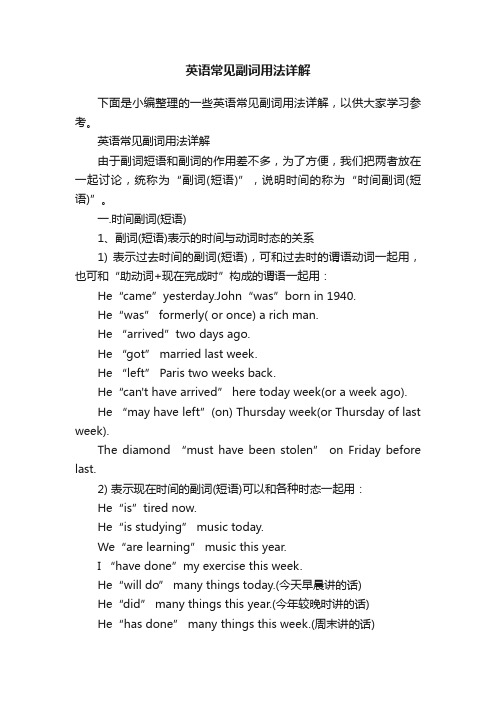
英语常见副词用法详解下面是小编整理的一些英语常见副词用法详解,以供大家学习参考。
英语常见副词用法详解由于副词短语和副词的作用差不多,为了方便,我们把两者放在一起讨论,统称为“副词(短语)”,说明时间的称为“时间副词(短语)”。
一.时间副词(短语)1、副词(短语)表示的时间与动词时态的关系1) 表示过去时间的副词(短语),可和过去时的谓语动词一起用,也可和“助动词+现在完成时”构成的谓语一起用:He“came”yesterday.John“was”born in 1940.He“was” formerly( or once) a rich man.He “arrived”two days ago.He “got” married last week.He “left” Paris two weeks back.He“can't have arrived” here today week(or a week ago).He “may have left”(on) Thursday week(or Thursday of last week).The diamond “must have been stolen” on Friday before last.2) 表示现在时间的副词(短语)可以和各种时态一起用:He“is”tired now.He“is studying” music today.We“are learning” music this year.I “have done”my exercise this week.He“will do” many things today.(今天早晨讲的话)He“did” many things this year.(今年较晚时讲的话)He“has done” many things this week.(周末讲的话)3) 有些副词(短语),可和现在完成时或一般过去时的动词一起用:I“saw”(or“have seen”) him lately(or of late,recently,before,before now,all along,right along, in the past,over the years).He has just gone out.(英式)He just went out.(美式)4) 有些副词(短语),多和完成时态的动词一起用,偶尔和其他时态的动词一起用:He“has been” ill since 2 June(or ever since,since two months ago).Till now(or Up to now,Until this time)nothing“has happened”.So far(or As yet,Thus far) he“had said” nothing to me.So far he “was trying” without success.There “is” as yet no hope for peace.The guests “(had) arrived” by([=before or at] seven o'clock).5) 表示未来时间的副词(短语),必须和将来时或现在(一般或进行)时的动词一起用:He“will come” tomorrow.I“shall meet” him some day(or one day).He“will begin” his work next week.He“will call” on me in ten days(or in ten days time,ten days from now).He“will do” it soon(or shortly,presently,instantly,before long,by and by).(这6个副词及副词短语也可以和过去将来时的动词一起用:He“would do”it soon.He “would come” shortly.)He“arrives”this coming Thursday.He“is to move”(on)Friday(of)next week.He“is leaving” today week(or a week from today).He“is returning” this day month(or a month from this day).6) 个别副词(短语)可以和过去时或将来时的动词一起用:She came last Monday and he “came” the day before(or two days later).She will come next Monday,and he “will come” the day be- fore(or two days later).7) 频度副词(短语)可以和任何时态的动词一起用:He“studied”(or“had studied”,“was studying”,“studies”,“is studying”,“has studied”,“will study”)every day.He“is”always(or often,frequently,sometimes,occasion- ally,seldom,rarely,scarcely,hardly,never)ill.I“have warned” him once again(or a time or two,once in a long while,now and then,now and again,again and again,time and again,over and over again ).He will be permanently(or forever)blind.The periodical“is” published daily(or weekly,monthly,quarterly,yearly).8) 表示时间长度的副词(短语)可以和任何时态的动词一起用:He“stayed”in France(for)three years.They“gambled” all the year(round).They “gambled” all the night (thro ugh).He“started”work from 1950.He“served”his country till his death.He“will work” for me during my absence.He “can cross” the river in thirty minutes(or in a short time).We“are working” all(the) day long.The fish “will not live”over the night(or over this week).He“has done” much over the year.I “have done”nothing during the vacation.2、某些时间副词(短语)的特殊用法1) 有些时间副词(短语)的特殊用法值得注意:I shall go tomorrow(=the day after today).但:He went last Sunday,(or on the following day)(不能说I went on tomorrow).但:He went last Sunday,and I went on the previous day (or the day before)(不能说yesterday).He will go next Sunday,and I will go on the previous day(or the day be- fore)(不能说yesterday).2)I saw him three days ago(=on the third day before to- day).但:I arrived last Sunday and I informed him of my arrival three days before(=on the third day before last Sunday)(不能说three days ago).3)I shall see him in three days(=on the third day after to- day)(不要说after three days).但:I arrived last Sunday and I saw him three days later (or three days afterwards,after three days,in three days).I shall arrive on 6 July and will see him three days later(or three days afterwards,after three days,in three days).。
副词的用法总结

副词的用法总结副词是一类重要的词性,常被用于修饰动词、形容词、副词或整个句子。
它们用来描述一个动作或状态的方式、程度、时间、地点等。
在英语中,副词的用法非常丰富多样。
本文将对副词的用法进行总结和梳理,以帮助读者更好地理解和运用副词。
1. 修饰动词副词常用来修饰动词,以表达动作的方式、程度或频率。
- 表示方式的副词:例如,carefully(小心地)、quickly(快速地)、slowly(慢慢地)等。
这些副词告诉我们动作是如何进行的。
- 表示程度的副词:例如,very(非常)、quite(相当)、extremely(极其)等。
这些副词用来表示动作或状态的强度或程度。
- 表示频率的副词:例如,always(总是)、often(经常)、sometimes(有时候)等。
这些副词告诉我们动作发生的频率。
2. 修饰形容词副词也可以用来修饰形容词,以强调或限定形容词的程度。
- 强调程度的副词:例如,very(非常)、really(真正地)、extremely(极其)等。
这些副词用于加强形容词的描述。
- 限定程度的副词:例如,fairly(相当地)、quite(相当)、rather(有点儿)等。
这些副词用于限定形容词的程度。
3. 修饰副词副词还可以用来修饰其他副词,以表达更精确和复杂的意义。
- 修饰副词的副词:例如,very(非常)、quite(相当)、rather(有点儿)等。
这些副词用于修饰其他副词的程度或强调。
- 修饰时间的副词:例如,now(现在)、soon(很快)、never(从不)等。
这些副词用于修饰副词表示时间的情况或频率。
4. 修饰整个句子副词也可以用来修饰整个句子,以表达说话者的态度、观点或判断。
- 表达态度的副词:例如,fortunately(幸运地)、sadly(悲伤地)、happily(快乐地)等。
这些副词用于修饰整个句子,表达说话者对某种情况的态度或感受。
- 表达观点的副词:例如,obviously(显然地)、clearly(明显地)、presumably(大概)等。
- 1、下载文档前请自行甄别文档内容的完整性,平台不提供额外的编辑、内容补充、找答案等附加服务。
- 2、"仅部分预览"的文档,不可在线预览部分如存在完整性等问题,可反馈申请退款(可完整预览的文档不适用该条件!)。
- 3、如文档侵犯您的权益,请联系客服反馈,我们会尽快为您处理(人工客服工作时间:9:00-18:30)。
C.fluentlyD.actually
【答案】B
【解析】
根据improving和day by day可知,琳达的身体在一天天“逐渐地(gradually)”康复。frequently频繁地;fluently流利地;actually实际上,均不符合语境。
A.casuallyB.consequentlyC.curiouslyD.constantly
【答案】C
【解析】
考查副词辨析。Casually随便的,偶然的consequently因此,结果curiously好奇地constantly持续地
句意为那个活泼的男孩突然看起来出奇地安静,因此他的妈妈知道不寻常的事情发生了。
【答案】A
【解析】
试题分析:考查副词。句意:明天的天气主要是晴天,但有时多云,他计划和家人一起野餐。A.Mainly主要是;B.Occasionally时不时;C.roughly粗糙;D.Extremely极度;天气好才会想到去野餐,所以天气主要是晴天,故选A项。
考点:考查副词
15.The lively boy suddenly appeared to be ________ quiet, so his mother knew something unusual must have happened.
2.The task wasn’t easy, but we managed it __________.
A.anyhowB.anywayC.somehowD.some way
【答案】C
【解析】
略
3.Linda's health is improving ________ day by day, and the doctor has advised her to stay home for a couple of weeks.
答案:B
4.The man should be excused because he caused the damage _______.
A.deliberatelyB.unintentionally
C.meaningfullyD.determinedly
【答案】B
【解析】
句意为这个人应该被原谅,因为他是无意中造成了伤害。故选unintentionally无意地。
C.stricken; slightlyD.striking; temporarily
【答案】D
【解析】
考查非谓语动词和副词。A. striking; unusually不寻常地;B. struck; instantly立即地;
C. stricken; slightly轻微地;D. striking; temporarily临时地。星期五一次6.7级的地震在Xinjiang’s Akto County发生,导致新疆南部铁路区段暂时关闭。第一空是现在分词做后置定语,表主动关系就;第二空是副词修饰过去分词。根据句意可知答案为D。
A.UsuallyB.GenerallyC.ActuallyD.Exactly
【答案】C
【解析】
【详解】
考查副词词义辨析。句意:——你觉得她的建议怎么样?——事实上,以后再讨论这个问题要明智得多。A. Usually通常情况下;B. Generally大体上;C. Actually事实上;D. Exactly精确地。分析句意可知,此处应表示从事实情况来看,以后再讨论这个问题要明智得多。故选C项。
—Take care,with all this fog.
A.especiallyB.mainlyC.extremelyD.really
【答案】A
【解析】
考查副词辨析。尤其是在这样有雾的天气。A尤其B主要地C极其地D真正地
10.With no shortage of gamers, China’s e-sports industry ______ needs to fill positions in roles such as management, coaching and broadcasting.
11.I had ______ wanted to rush outside and leave all the frustrating things behind but something told me I had to stay and face the music.
A.gracefullyB.reluctantlyC.essentiallyD.desperately
【答案】D
【解析】
【详解】
考查副词词意辨析。句意:我迫切地想要冲出去,把一切烦心事都抛在脑后,但我却不得不面对现实。A. gracefully优雅地;B. reluctantly不情愿地;C. essentially本来;D. desperately迫切地。根据后文but something told me I had to stay and face the music.可知,此处应为“迫切想要做某事”。故选D项。
5.A 6.7-magnitude earthquake, _______ Xinjiang’s Akto County on Friday, caused sections of railway in Southern Xinjiang to be _________closed.
A.striking; unusuallyB.struck; instantly
考点:考查副词辨析
18.It was not surprising that when some of the terracotta warriors were taken to the British Museum for
6.— Do you often come here to have a walk?
— No, only _________, because we are much too busy.
A.occasionally B.eventually
C.merely D.frequently
【答案】A
【解析】
英语副词用法总结(完整)
一、单项选择副词
1.Let your child learn to be independent, for ______ he will leave home to lead his own life as a fully independent adult.
A.thankfullyB.alternativelyC.definitelyD.eventually
【详解】
考查副词。上句:你经常来这里散步吗?下句:不,只是偶尔,因为我们太忙。A.occasionally偶尔;B. eventually最后;C. merely仅仅;D. frequently频繁地。故选A。
7.“Qianshui”, which _________means diving water, refers to someone who only views the postings across the website but never makes any comments.
14.Tomorrow there will be _______ sunshine with cloudy intervals so he has made a plan for a picnic with his family.
A.mainlyB.occasionallyC.roughlyD.Extremely
12.This sort of clothing material, which feels soft, ______.
A.catches fire easilyB.is caught fire easily
C.is easy caught fireD.is easily to catch fire
句意为,----你认为第十一届中国全运会成功吗?---当然,绝对是成功的,再好不过了。
17.Although we haven’t got the accurate statistics, it is estimated that ______ 300 factories in this province closed down during the economic crisis.
【答案】D
【解析】
【详解】
考查副词词义辨析。句意:让你的孩子学会独立,因为他最终会离开家,作为一个完全独立的成年人过自己的生活。A. thankfully感谢地;B. alternatively或者;二者择一地;C. definitely当然;明确地;D. eventually最终。依据句意可知,孩子最终会离家独立生活。故选D。
A.frequentlyB.deliberatelyC.desperatelyD.fundamentally
【答案】C
【解析】
【详解】
考查副词辨析。句意:由于不乏玩家,中国的电子竞技行业迫切需要填补管理、教练和广播等职位的空缺。A. frequently频繁地;B. deliberately故意地;C. desperately极度地;D. fundamentally根本地;基础地。根据句意故选C。
16.--- Do you think that the 11th Chinese National Games were a success ?
--- Yes, ___! It couldn’t be ____ .
A.relatively ; betterB.approximately ; worse
A.absolutelyB.relativelyC.universallyD.approximately
